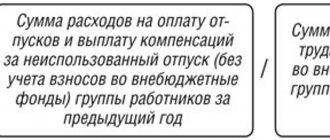The nuances of awarding an award
Standard monthly bonuses act as part of the salary, therefore they are included in the remuneration system based on Art. 135 TK. Additionally, the head of the company can assign one-time bonuses under Art. 191 TC, which are not included in the salary. Typically, funds are paid only to employees who have distinguished themselves in some way at work, so they should be rewarded.
The rules and procedure for transferring one-time bonuses to employees must be enshrined in the internal documentation of the enterprise.
Types of employee incentives
An employment contract concluded between an employer and an employee implies mandatory remuneration. Since money is paid for labor, this payment is called wages.
Salary is remuneration for work of full-time employees of an organization (individual entrepreneur). The size of the salary depends on the qualifications of the employee, the complexity, quantity, quality and conditions of the work he performs. In addition to the salary (tariff rate), the salary includes various compensations, additional payments and allowances, as well as incentive payments, for example, bonuses (Article 129 of the Labor Code of the Russian Federation).
There are bonuses paid on a regular basis and one-time bonuses. Both are paid on the basis of the administrative document of the head of the organization. For example, this could be an order for a one-time bonus for an employee.
We recommend developing and implementing a Regulation on Bonuses at the enterprise, which will set out a clear procedure for issuing both regular and one-time bonuses. Such a local regulation will increase employee motivation and minimize disputes about the need to pay a bonus.
When are funds paid?
One-time bonuses are assigned if there are compelling reasons, so they are most often transferred in the following situations:
- an employee has increased their productivity;
- due to the active work of the citizen, the number of customers in the store increased;
- a production specialist has increased the competitiveness or quality of the products created;
- Bonuses are paid before holidays or various significant events in the lives of employees.
The decision to assign such a payment is made only by the head of the enterprise, therefore it is not his direct responsibility. Often, funds are assigned to employees who replaced other employees, performed actions not provided for in their job description, or were involved in optimizing business processes in the company.
What is the benefit of paying one-time transfers?
The payment of one-time bonuses is considered a more profitable measure for employers compared to increasing the salary of employees. This is due to the following reasons:
- the transfer of additional bonuses is carried out only after the corresponding decision has been made by the head of the enterprise, therefore, if the director decides to deprive a particular specialist of this payment, then it is impossible to challenge such a decision;
- it is allowed to transfer such funds not within a strictly established time frame, but with a certain delay;
- The deadline for the payment of such funds is not strictly established, therefore violations of the deadlines do not fall under Art. 136 TK;
- if necessary, the head of the company can reduce the payroll by denying bonuses to all employees.
But the transfer of bonuses must be economically justified. Therefore, the head of the company must determine in advance the reason for charging this amount. Most often, economic reasons are used for this, represented by an increase in the company’s income or the onset of some holiday event for the enterprise.
Why is it profitable to pay one-time bonuses instead of increasing salaries?
- Payments of one-time bonuses are made only by decision of the employer.
- An employee cannot challenge the actions of an employer who refused to pay him a one-time bonus.
- The premium may be paid late. The timing of payment of bonuses is not fixed in law and does not fall under Article 136 of the Labor Code of the Russian Federation.
Thus, paying employees a salary and a one-time bonus provides the director with more “maneuvers” to reduce monthly regulation and reduce the payroll if necessary. The law does not provide for liability for the director and accountant for delays in payment of bonuses.
Not forget
Payment of bonuses, like any other expense of the company, must be economically justified. “Summarize” the business case for the premium in advance.
To justify the payment of a bonus, you can use a variety of indicators: from economic (the amount of money received from customers; the number of invoices issued and paid) to disciplinary (including compliance with the dress code).
Conditions for payment of funds
Accrual of a one-time bonus is possible only if certain conditions are met, which are regulated not only by law, but also by internal local acts of companies. Most often, the basic conditions are prescribed in the collective labor agreement or in the bonus regulations.
These main conditions include:
- if the director decides to pay funds to an employee from the organization’s retained profits, then he must make such a decision officially, for which a meeting of shareholders is held, a protocol is drawn up and the decision is approved;
- Often, the company’s internal documentation indicates the need to transfer bonuses to employees for length of service or when new modern equipment is put into operation;
- there is no requirement to indicate the size of the lump sum payment in each employee’s employment contract.
Other conditions depend on the decision made by the company's management.
What requirements are met?
Before paying a one-time bonus, the director of the company must take into account some restrictions:
- if the company has a trade union, then all provisions related to bonuses must be agreed upon with its members;
- it is allowed to increase payments, but not reduce them if they are stipulated in the employment contract;
- If the head of the company decides to assign payments to employees, then the organization’s accountant must draw up a special certificate, and the head issues an official order.
The amount of additional payments may vary slightly for different employees. The manager independently determines which employee will receive a particular payment at a certain point in time.
What documents are being prepared?
Vacation and one-time bonuses, as well as other payments to employees, must be officially recorded in the organization’s documentation. Only in this case will they be taken into account for tax purposes. If an employer prefers to pay employees one-time bonuses for various reasons, then they must prepare the following documents:
- information about bonuses is included in the collective labor agreement;
- information on the accrual of these bonuses is included in individual labor agreements drawn up separately with each employee;
- wage regulations;
- bonus regulations containing information on bonuses paid monthly;
- provision on one-time transfers, which can be transferred for length of service, paid for holidays or assigned for other reasons.
Only with proper execution of one-time bonuses for holidays or other significant events can you use them to reduce the tax base for income tax.
Order for payment of bonus
Bonuses are paid to employees based on the order of the manager. It should describe in detail who receives the bonus, for what merits and in what volume. Based on clause 24 of the Rules for maintaining a work book, after issuing an order, the following information is indicated in the work book :
- On the presentation of certificates and letters of gratitude, the conferment of special titles and the awarding of other insignia that are produced in the company;
- About other types of remuneration that are provided for in Russian legislation, as well as in collective agreements and other internal documents of the company.
A manager’s order can affect only one employee or an entire group. One way or another, the order must state which clause of the bonus regulations it refers to, what volume and procedure for issuing the bonus is implied. Employees read the order and sign it.
The order can be issued using forms No. T-11 or No. T-11a
Regular bonuses or payments that are part of wages are not entered in the work book. Such incentives can be reflected in the employee’s personal card.
To classify an incentive payment as an expense that reduces the income tax base, you need to pay attention to the unified form of primary accounting of wage papers adopted by the State Statistics Committee of the Russian Federation.
Forms No. T-11 and T-11a are used when registering and accounting for remuneration to employees for special achievements; they are signed after the relevant order is issued by the head of the structural unit of the company in which the employee works. They are also signed by the director or his authorized representative, then they are announced to the employee, who must sign. After this, a corresponding note is made in his personal card.
With regard to the rules for the payment of bonuses that are part of remuneration or provided for in the regulations on bonuses and the employment contract, it is not necessary to issue an order from the manager.
Read material on the topic: Accounting for gifts to employees, their children, clients and business partners
Rules for drawing up bonus regulations
Before paying a one-time bonus, the head of the company must correctly formalize its accrual. For this purpose, an appropriate bonus provision is formed. It reflects the actual practice of the company in relation to the transfer of bonuses to employees. This document contains the following information:
- it is stated that additional funds are transferred to employees only when certain goals are achieved, for example, with an increase in sales or the number of customers, upon the occurrence of a holiday event, or under other conditions;
- the evaluation criteria and conditions for calculating the bonus are listed;
- the amount of payment is indicated;
- All employees of the company are listed who can count on these funds to achieve specific goals.
The size of the payment can be represented by a fixed amount of funds or a percentage of the salary. Each company can use its own unique indicators, taking into account the specifics of its activities. The provision may include other conditions or information that depend on the field in which the company operates, how many employees it employs, and what the average salary of employees is.
One-time bonuses are assigned only on the basis of the regulations. An example of such a provision can be found below.
What is a premium
It would seem that what could be difficult for the company’s management in setting bonuses?
At first glance, all you need to do is decide what and how much to pay additional amounts for. But in practice everything is much more complicated. This is due to the dual legal essence of the term “award” itself. The first mention of bonuses in the Labor Code is found in Article 129, in the part that is devoted to the definition of the term “wages”. In it, the legislator says that salary, as a legal entity, includes three components. The first is the actual remuneration for work, the amount of which depends on the qualifications of the employee, complexity, quantity, quality and conditions of the work performed. The second is compensation payments (for example, for work in difficult conditions, at night, etc.). The third is incentive payments, among which the legislator directly names bonuses and other incentive payments.
It turns out that from the point of view of Art. 129 of the Labor Code of the Russian Federation, a bonus is part of wages. This finding could have far-reaching consequences. For example, it means that the employer is obliged to pay monthly bonuses to employees. After all, payment of wages is one of the main obligations of the employer under the employment contract (Article of the Labor Code of the Russian Federation).
Calculate your advance and salary for free, taking into account all current indicators
However, if you read the Labor Code further, you will find Article 191, which also talks about bonuses. And at the same time, it classifies them as incentives for work, which are applied by the employer to employees who conscientiously perform their job duties. That is, from this article it no longer follows that the bonus is part of the salary to which any employee has the right.
From the point of view of Art. 191 of the Labor Code of the Russian Federation, the bonus is given only to those employees who conscientiously perform their job duties. And the decision to pay a bonus (and not to apply other incentives - gratitude, a valuable gift, etc.) is made by the employer. As we can see, the bonus from the standpoint of Art. 191 of the Labor Code of the Russian Federation is not a mandatory payment, to which any employee has the right, but a kind of optional additional payment for conscientious work.
Consequences of drafting the regulations
A one-time production bonus in 6-NDFL is reflected only when it is officially registered. Otherwise, the payment acts as a gift if its size does not exceed 4 thousand rubles.
If the manager draws up a bonus clause, then he has an obligation to pay these funds to the company’s employees. Employees, if necessary, can demand that the manager transfer this money. Therefore, information is usually included in the document that allows, if necessary, to deny funds to hired specialists.
Are insurance premiums paid?
Taxes are paid on a one-time bonus only if it is properly processed. Insurance premiums are transferred by the employer from this amount, regardless of whether it is included in expenses when calculating income tax. Therefore, the employer will not be able to save on these contributions.
If a citizen works in a joint-stock company, then the founders have the right to transfer funds from retained earnings. In this case, they will have to hold a shareholders meeting and also formally make a decision. This method of transferring bonuses does not reduce the company's taxable profit.
The concept of the thirteenth salary
In many companies there is such a thing as the thirteenth salary. It is paid at the end of the year as an incentive to employees if the necessary funds are available in the wage fund. It is a one-time payment, since the head of the company cannot be sure that at the end of the year there will be enough money left in the fund to transfer the thirteenth salary to all employees of the enterprise.
The legislation does not contain information on how this bonus should be correctly transferred to hired specialists. Therefore, company managers pay it to their employees only if they have the desire and the appropriate financial capabilities. The company's accountant cannot make such a payment as a monthly salary, so it is only an addition to earnings.
In many companies, the thirteenth salary is fixed in internal regulatory documentation. The employer determines exactly when funds are transferred to employees, as well as what the payment procedure is. Most often, this information is included in the bonus regulations. If such a payment is issued as a one-time bonus, then the head of the company can independently select the employees to whom the funds will be transferred.
13th salary
The thirteenth salary is the annual payment to the employee at the end of the year. In fact, this is a bonus at the end of the year. Often it is equal to the amount of the average monthly payment.
The law does not regulate such a bonus in any way. The employer has the right to pay it at his own request. The accounting department cannot process the thirteenth salary as monthly wages. There is simply no 13th month in the year.
Therefore, if you want to use this type of payment, you need to provide for the amount and procedure for paying the thirteenth salary in internal documents. For example, in the Regulations and bonuses or draw up a separate Regulations on bonuses based on the results of the year. Please note that the 13th salary is a bonus at the end of the year. This means that it cannot be calculated before the end of the year. To avoid problems with inspectors, keep this fact in mind.
If you register the 13th salary as a one-time bonus, the director can independently decide: to whom, according to what indicators and when to pay it.
Rules for issuing an order
Accounting for one-time bonuses requires the need for their correct registration. If the employer decides to transfer these funds to one or more employees, then he must correctly formalize it by issuing an appropriate order. When preparing this document, the following points are taken into account:
- the order contains information about when and in what amount the bonus is transferred to a specific employee or several employees of the enterprise;
- if there are hired specialists of the company who are not entitled to payments, then they are simply not included in this order;
- if an employee who does not receive a bonus tries to challenge management’s decision by filing a complaint with the labor inspectorate, then the manager must refer to the content of the bonus regulations;
- the order is issued in Form No. T-11, if funds are paid to only one employee who has in any way distinguished himself before the company’s management;
- if payments are assigned to several employees of the enterprise, then form No. T-11a is selected.
Directly in the order, the head of the company indicates the reason for these one-time payments. The one-time bonus income code is given, and it is also indicated when exactly the funds will be paid to employees. The employer independently decides in what form the money will be allocated. They can be issued in cash through the company's cash desk. If a company's employees receive their salaries into a bank account, bonuses are usually transferred to this account.
Premium: types of expenses and taxation
In the most general case, bonuses are included in labor costs on the basis of clause 2 of Art. 255 Tax Code of the Russian Federation. Payments that fall under the criteria reflected in clauses 21 and 22 of Art. 270 of the Tax Code of the Russian Federation, in turn, cannot be included in the tax base - these are precisely those remunerations that are not included in the remuneration system, as well as bonuses paid from special purpose funds or targeted revenues.
Thus, in calculating the tax base, only those types of incentive bonuses can be taken into account that:
- provided for by the remuneration system in accordance with agreements and local regulations;
- are not included in the list of expenses that are prohibited from being taken into account when calculating the tax base by law (as is the case with expenses under Article 270 of the Tax Code of the Russian Federation, given above).
If the bonus is provided only by the employment contract, then it is also considered included in the remuneration system (letter of the Ministry of Finance No. 03-03-06/1/33167).
The employer independently determines:
- how often and for what reason incentives are paid in the form of a bonus;
- the amount of the corresponding incentive is paid each time.
At the same time, the size, as well as the frequency of payments, should be determined taking into account their economic feasibility (letter of the Ministry of Finance of Russia dated July 8, 2019 No. 03-03-06/1/49986). A too large payment in the form of a cash bonus is highly likely to raise questions from regulatory authorities. They may require documents from the employer confirming that the bonus was awarded for a reason, but for the achievement of certain production indicators (letter of the Federal Tax Service of Russia dated April 1, 2011 No. KE-4-3/5165).
It is fair to say that the least number of comments from the Federal Tax Service will be caused by certain types of monthly bonuses tied to the achievement of production indicators for the month. In turn, tax authorities regularly do not recognize bonuses for holidays and anniversaries as labor payments and do not allow them to be included in expenses when calculating the tax base. Arbitration practice in this regard is contradictory: some courts support the Federal Tax Service (resolution of the Arbitration Court of the North Caucasus District dated April 15, 2015 No. A18-138/2014), others support employers (resolution of the Arbitration Court of the Moscow District dated December 5, 2014 No. A40-12724/2014).
The bonus paid to a dismissed employee is not included in the wage system by regulatory authorities due to payment outside the period of employment (letter of the Ministry of Finance of Russia dated November 20, 2013 No. 03-11-06/1/50026). It cannot be included in expenses.
Bonuses, as employee income, are subject to personal income tax and contributions. If the total amount of payments does not exceed 4000 rubles. per year, then they can be qualified as a gift and exempt from tax on the basis of clause 28 of Art. 217 Tax Code of the Russian Federation. For amounts exceeding the specified limit, bonuses (types of bonuses and grounds do not play a role here) are subject to personal income tax and, in most cases, contributions.
Most payments to employees are subject to insurance premiums. Let's consider the order in which the types of bonuses (incentive payments) that make up employee bonuses are taxed.
Are taxes collected on payments?
One-time bonus payments are regulated differently than regular incentive transfers. But personal income tax must be paid from them if they are properly prepared. Additionally, insurance premiums are transferred from them.
To correctly calculate and pay personal income tax, the following requirements are taken into account:
- the possibility of transferring one-time payments is provided for by the content of the company’s internal regulations;
- only payments that are assigned for any services to the company, and are not tied to weekends or other events, are applied to accounting;
- all costs associated with paying taxes are certainly recorded in the company’s accounting records.
Personal income tax on a one-time bonus is paid by the direct employer, acting as a tax agent for its employees.
Memo for the award
It is important to understand that the payment of the premium must have a basis. In this case, it is necessary to distinguish between regular and one-time bonus payments. In the first case, as a rule, the grounds are provided by a collective agreement or internal regulations adopted by the enterprise.
In the case of one-time payments, there must be a document stating that a certain employee needs to be paid a bonus for a certain reason. One option for such a document could be a memo from the head of the department sent to the management of the enterprise.
The legislation does not regulate a specific form of the document, which in the future will be the basis for payment of the premium. However, this document must contain the following information:
- it is necessary to provide objective indicators that are the basis for receiving a specific type of bonus;
- the wording is given, which indicates exactly what the reward is for;
- registration of the document must be carried out on the basis of current regulatory documents.
If such a memo is written with violations, then in the future, during an audit, this may become the basis for the conclusion that the payment of the bonus was illegal.
Other important nuances
Before charging a one-time bonus, the employer must take into account some significant features. These include:
- if a bonus is paid upon dismissal of an employee, then personal income tax is charged on it under general conditions;
- if funds are transferred for holidays or other significant events, then they are not related to the professional activities of employees, therefore such expenses cannot reduce the tax base for corporate income tax;
- Unified agricultural tax is not withheld from such remuneration.
Employers can pay one-time remunerations using different taxation systems. It is important to consider whether these payments reduce the tax base.
What wiring is used?
Accountants must be aware of bonus income codes and the entries used. When transferring these funds, information must be entered into accounting records. For this, wiring D91-2 K70 is used. Based on it, an incentive payment is credited from the company’s net profit.
This quotation can be used when using any type of profit, which may be current or for the previous tax period. Since such expenses are other, D91-2 is used.
What revenue codes are used?
Employees may require their employer to create a 2-NDFL certificate at any time. It is required to solve numerous problems, for example, when applying for a loan or receiving other services. This document contains information about all cash receipts of the employee, indicating their code. Therefore, the question arises, what is the income code for one-time bonuses. The main such codes include:
- Code 2002. It is used if a company employee is paid bonuses for various achievements at the place of work. They may be provided for by legal requirements, the content of an employment contract or a collective agreement. This code is used when paying bonuses based on the results of a month, quarter or year, as well as when transferring money for completing important tasks or for unique production achievements.
- Code 2003. It is used if remuneration is transferred from company income or through the use of special purpose money. This code is relevant if the company's target money is used. Typically, this code is used if a bonus is paid for various festive events or anniversaries. Often such payments act as financial motivation for employees. They are not related to the performance of official duties of employees.
- Code 2000. Used in a situation where a bonus is awarded for long service.
Using such codes in the 2-NDFL certificate, you can understand exactly what funds were received by the employee at one time or another. The same code is used to mark a one-time production bonus in 6-NDFL. The company's accountant must competently approach the filling out of these documents, since he is responsible for any errors or violations identified.
What are the types of employee bonuses?
The Labor Code does not oblige the employer to establish any specific types of bonuses (employee remuneration), providing only that wages may include incentive payments of an incentive nature, a particular case of which are bonuses (Article 129 of the Labor Code of the Russian Federation). If the employer pays bonuses, the procedure for calculating them must be regulated in a collective agreement or local regulation (Article 135 of the Labor Code of the Russian Federation). An employer with the status of a micro-enterprise has the right to do without such regulation (Article 309.2 of the Labor Code of the Russian Federation). The Code states that the employer issues a bonus to reward the employee for the conscientious performance of duties (Article 191 of the Labor Code of the Russian Federation).
Due to the lack of strict legislative norms, the payment of bonuses (type of payment) can be regulated in different ways. The most common classification of awards is the following:
- regular bonuses (issued based on the results of a particular reporting period, for example, month, quarter, year);
- irregular bonuses (issued for a specific reason, for example, achievement of good production results).
A bonus that is not regulated by certain agreements or local regulations is not considered part of the salary (letter of Rostrud dated October 23, 2007 No. 4319-6-1, Ministry of Health and Social Development of Russia dated October 13, 2011 No. 22-2/377012-772). And therefore, in particular, it is not taken into account when calculating the average salary of an employee. In turn, the inclusion of irregular bonuses in labor costs when determining the tax base may not be supported by regulatory authorities (letter of the Ministry of Finance of Russia dated July 9, 2014 No. 03-03-06/1/33167).
Thus, the types of bonuses to employees determine the procedure for their taxation. Let's get acquainted with the basic principles of its implementation.
Employer's liability for violations
Often, employees have to deal with the fact that the employer does not pay one-time bonuses, although the need for these transfers is determined by internal local acts or a collective agreement. In this case, refusal to pay bonuses is a violation on the part of the director of the company.
Under such conditions, employees can file a complaint with various government inspection authorities. The best way is to write an application to the labor inspectorate. Specialists of this service will conduct an inspection, the main purpose of which will be to identify violations of workers’ rights by the organization’s management. Although the transfer of one-time bonus payments is not subject to legal requirements, if this obligation is enshrined in regulatory documents, then the manager is obliged to follow these standards.










